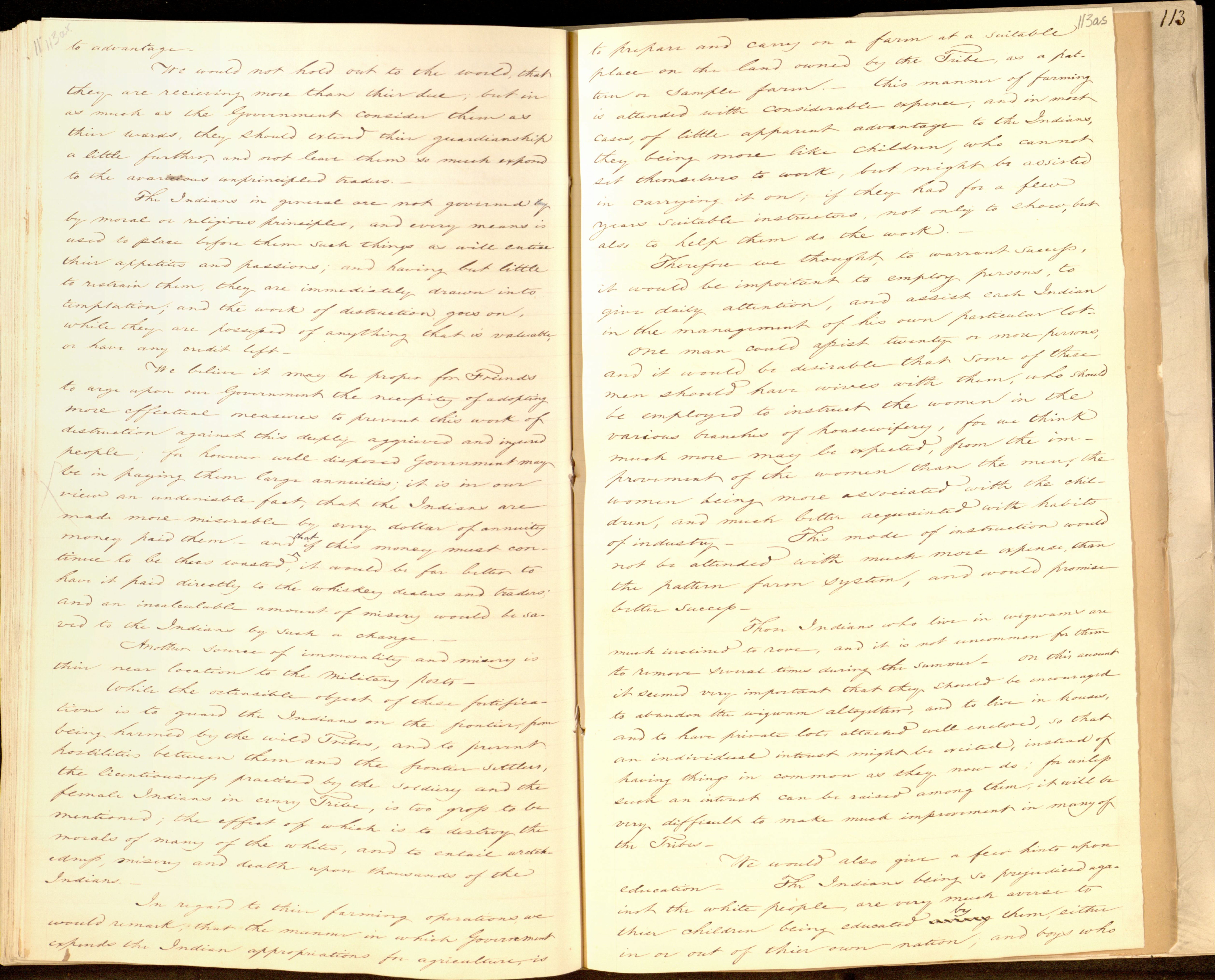to advantage.
We would not hold out to the world, that
they are recieving more than thier
due, but in
as much as the Government
thier wards, they should extend thier guardianship
a little further, and not leave them so much exposed
to the avaricious unprincipled traders.
The Indians in general are not governed by
by moral or religious principles,
and every means is
used to place before them such things as will entice
thier appetites and passions; and having but little
to restrain them,
they are immediately drawn into
temptation; and the work of destruction
goes on,
while they are possessed of anything that is valuable,
or
have any credit left.
We believe it may be proper for Friends
to urge upon our Government
more effectual measures to prevent this work of
destruction against this deeply aggrieved and injured
people; for however well disposed Government
be in paying them large annuities; it is in our
view an undeniable fact, that the Indians are
made more miserable by any dollar of annuity
money paid them--and that if this money must con-
tinue to be thus wasted, it would be far better to
have it paid directly to the whiskey dealers and traders;
and an incalculable amount of misery would be sa-
ved to the Indians by such a change.
Another source of immorality and misery is
thier near location to the
Military posts.
While the ostensible object of these fortifica-
tions is to guard the
Indians on the frontier, from
being harmed by the wild Tribes, and to
prevent
hostilities between them and the frontier settlers,
the
licentiousness practiced by the soldiery and the
female Indians in every
Tribe, is too gross to be
mentioned; the effect of which is to destroy the
morals of many of the whites, and to entail wretch-
edness, misery and
death upon thousands of the
Indians.
In regard to thier farming operations, we
would remark; that the manner in
which Government
expends the Indian appropriations for agriculture is
to prepare and carry on a farm at a suitable
place on the land owned by the Tribe, as a pat-
tern or sample farm--this manner of farming
is attended with considerable expence, and in most
cases, of little apparent adbantage to the Indians,
they being more like children, who cannot
set themselves to work, but might be assisted
in carrying it on; if they had for a few
years suitable instructors, not only to show, but
also to help them do the work.
Therefore we thought, to warrant success,
it would be important to employ
persons, to
give daily attention, and assist each Indian
in the
management of his own particular lot.
One man could assist twenty or more persons,
and it would be desirable that
some of these
men should have wives with them, who should
be employed
to instruct the women in the
various branches of housewifery, for we think
much more may be expected, from the im-
provement of the women than
the men; the
women being more associated with the chil-
dren, and much
better acquainted with habits
of industry. This mode of instruction would
not be attended with much more expense, than
the pattern farm system,
and would promise
better success.
Those Indians who live in wigwams are
much inclined to rove, and it is not
uncommon for them
to remove several times during the summer--on this
account
it seemed very important that they should be encouraged
to
abandon the wigwam altogether, and to live in houses,
and to have private
lots attached well enclosed, so that
an individual interest might be
excited, instead of
having things in common as they now do; for unless
such an interest can be raise among them, it will be
very difficult to
make much improvement in many of
the Tribes.
We would also give a few hints upon
education. The Indians being so
prejudiced aga-
inst the white people, are very much averse to
thier
children being educated by them, either
in or out of thier own
nation; and boys who

